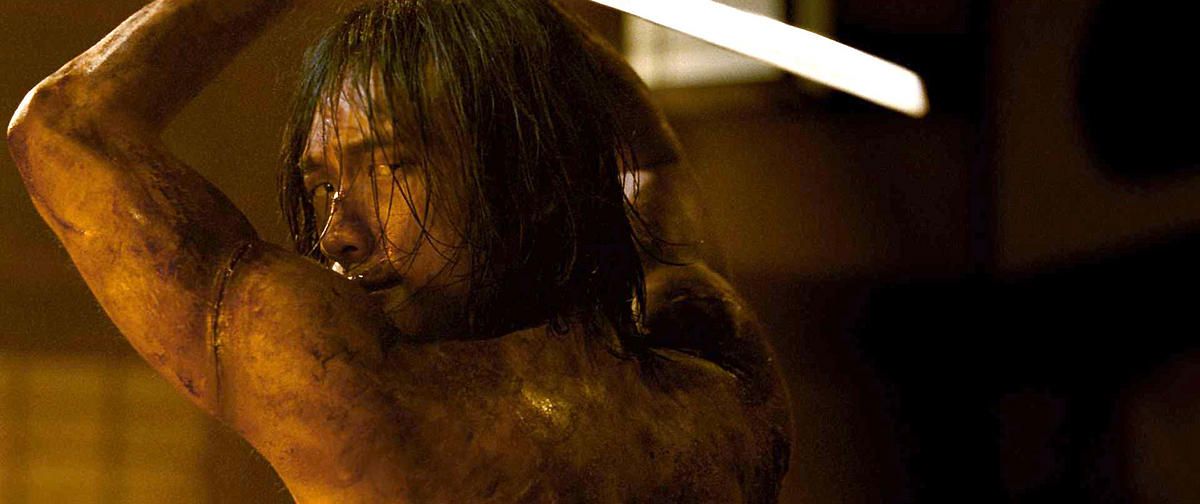In James McTeigue's "Ninja Assassin," the ninjas, like Carl Sandburg's fog, come on little cat feet. But if their movements are soundless, they sure make a splash, visually speaking: As these creatures of darkness go about their business, creeping about in their little black socks and hoods, the torsos of their opponents are sliced in two on the diagonal with clean precision; the occasional cheek and -- good God! -- even an eyeball gets slashed with one of those ever-popular all-in-one ninja tools; and one poor sod is decapitated right through the jawline -- you could say his mouth is left hanging open in amazement.
"Ninja Assassin" reaches such a high level of ridiculousness in its opening sequence -- thanks to the magic of computer graphics, the ninjas are so swift and so well camouflaged that we can't even see them -- that the thing can only make more sense as it goes along. And to an extent, it does. McTeigue made his directorial debut with the oversimplified, disappointing Alan Moore adaptation "V for Vendetta," which was written by Larry and Andy Wachowski. (He's frequently worked as a second-unit director for the filmmaking duo, who are credited as producers here.) "Ninja Assassin" is far less ambitious than "V for Vendetta," but it's also more effective -- if you can use that word to describe a movie that's mindlessly enjoyable and almost instantly forgettable. "Ninja Assassin" lives in the moment, a visceral gouge of a picture, and sections of it move so fast -- and are so intriguingly, dimly lit -- that you have to use your imagination a bit to discern what's happening.
The plot makes sense, broadly speaking, although it hardly matters: Naomie Harris is Mika, a bright young Europol researcher based in Berlin whose digging has brought her a little too close to a secret network of trained killers from the Far East, the Ozunu Clan, run by an Asian Robert Forster look-alike (played by martial-arts master Sho Kusugi). Ozunu's outfit steals little kids and trains them to be supremely effective (and expensive) ninja killers, ready to silently vanquish heads of state, troublesome gangsters and anyone else you might like to see offed, for a price. He's a cruel master, and he's none too happy when his star pupil, Raizo -- played in his grown-up incarnation by the Korean pop star Rain -- rejects the clan's ruthlessness and breaks away. As Raizo waits to take his revenge on the clan, he steps in to protect Mika, who's targeted by the organization's most ruthless ninja, and Raizo's nemesis, Takeshi (Rick Yune).
All of that meshugas is just an excuse for a succession of cartoonishly violent action sequences: McTeigue and his cinematographer, Karl Walter Lindenlaub, present much of the action in appropriately low lighting -- these are fighters who emerge from the shadows, after all, and the filmmakers know that things half-glimpsed are more intriguing than in-your-face visuals. That's not to say McTeigue's approach is particularly subtle: There's blood, viscous and orangey-red, spurting, bubbling and seeping everywhere. And I left the movie feeling that most of the effects weren't quite as elegant as they could have been: In one sequence, when a group of shadowy, inky killers descend upon one of their targets, they emerge from the corners of the frame, as if tiptoeing -- or gliding -- on velvet slippers. I wanted more of that, and maybe a little less go-for-broke slashing, although the cathartic value of all that shameless bloodletting shouldn't be underestimated.
And then there's the Beautiful People factor. McTeigue and his writers (Matthew Sand and J. Michael Straczynski, working from a story by Sand) are savvy enough to give us a degree of sexual frisson between the movie's two leads. This isn't the greatest role for Harris. (She was fun to watch in the last two "Pirates of the Caribbean" pictures, and she gave a solid performance in "28 Days Later." But she's extraordinary in the 2002 British television adaptation of Zadie Smith's "White Teeth," and she needs a movie role as good as that one.) But she's able to give her character a sufficient degree of low-key common sense, which makes her a good foil for Rain's smoldering, tortured Raizo. Rain wasn't elected to People magazine's "Most Beautiful People" in 2007 for nothing: His features are shyly expressive, and though he may not be Brando, he's not trying to be -- instead of overreaching, he plays it cool, and his stealth strategy works. In one scene, Raizo practices his ninja skills alone in his spare, dark Berlin apartment, executing handstands on a bed of spikes and so forth -- the only way to start the day, really. In preparation for the movie, Rain trained heavily for the better part of a year, reportedly eating only chicken breast and vegetables. Still, he carries himself casually and unself-consciously, as if it were commonplace for Asian pop stars to drop into the neighborhood, via Mount Olympus, from time to time. He's the movie's nonobvious superstar, its darkly glimmering shuriken.



Shares